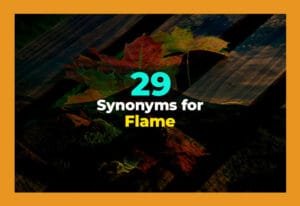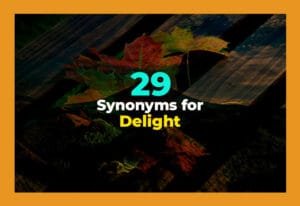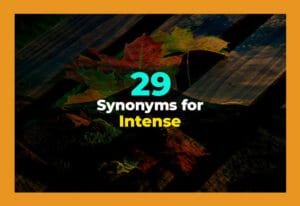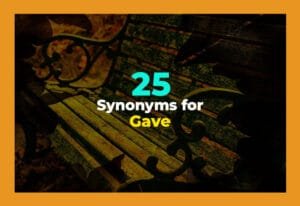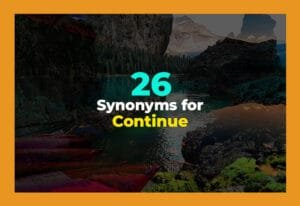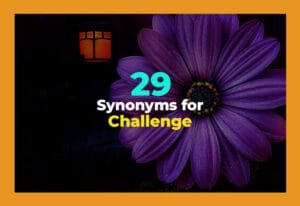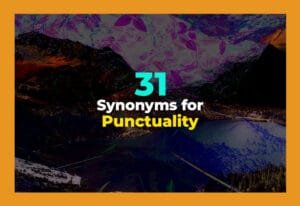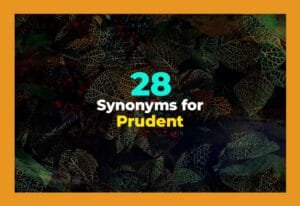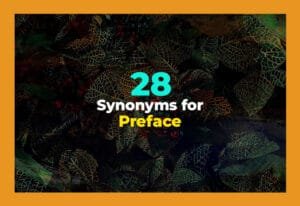We all encounter moments when our focus drifts, whether it’s due to a sudden interruption, a fun activity, or just a wandering mind. Words like diversion, interruption, and disturbance capture these moments well. In this article, we'll explore 31 different synonyms for distraction, explain when to use them, and give clear examples to help you use them naturally in conversation or writing.
31 Different Ways to Say DISTRACTION: Another Word for Distraction
Diversion
A diversion refers to something that draws your attention away from what you were doing. It works well in situations where the shift in focus is temporary and often intentional, such as a fun activity or a short break. Using "diversion" conveys a gentle shift, rather than an abrupt interruption, making it useful in both professional and casual contexts. It highlights that attention has been redirected, but not necessarily disrupted entirely.
- Watching a short comedy show was a welcome diversion from her stressful day.
- The traffic jam served as a diversion from the long, monotonous drive.
- He set up a game as a diversion while waiting for the meeting to start.
Interruption
Interruption implies a sudden halt or break in what someone is doing. It often carries a negative connotation because it disrupts progress or concentration. This word is appropriate when describing phone calls, unexpected visitors, or any event that stops a task in its tracks. "Interruption" emphasizes the momentary pause and the need to regain focus afterward.
- The phone ringing was an interruption during the lecture.
- She didn't mind a small interruption while cooking, but long breaks frustrated her.
- A fire alarm caused an unexpected interruption in the office work.
Disturbance
Disturbance suggests something that disrupts peace, calm, or attention. It can describe noise, behavior, or situations that affect concentration. This synonym works best when the distraction is external and unwanted. Using "disturbance" highlights the impact on productivity or focus, making it suitable for formal writing or when discussing problems caused by interruptions.
- The construction noise outside was a constant disturbance.
- His loud music became a disturbance to the neighbors.
- A disturbance in the classroom prevented the students from concentrating.
Interference
Interference conveys an obstacle that prevents someone from focusing fully. It is often used in technical, professional, or formal contexts but can also describe personal situations. This word emphasizes the hindrance rather than the mere diversion, making it effective when discussing factors that block or reduce attention.
- The static on the radio caused interference with the broadcast.
- Her coworker's constant questions created interference with her workflow.
- Interference from background noise made it hard to read.
Disruption
Disruption is a strong term for something that breaks the normal flow or routine. It implies that the distraction is significant enough to affect performance or progress. Use "disruption" when describing events, actions, or occurrences that interrupt a process, whether at work, school, or home. It emphasizes the impact rather than the cause.
- A sudden power outage caused a disruption in the meeting.
- The protest outside led to a disruption of daily business.
- The children playing loudly in the hallway were a disruption to the study session.
Amusement
Amusement represents a distraction that entertains or engages in a lighthearted way. Unlike interruptions or disturbances, amusement is usually positive and voluntary. It works well when the focus shift is enjoyable and meant to relieve stress or boredom, rather than being forced.
- The magician's performance was pure amusement during the party.
- Reading comics offered her a brief amusement between tasks.
- Watching funny videos on the phone became an amusement after dinner.
Entertainment
Entertainment refers to activities that capture attention for pleasure or relaxation. This synonym works when describing intentional distractions meant for enjoyment. Unlike interruptions, entertainment is deliberate and often welcomed.
- The movie provided entertainment on a rainy afternoon.
- Music became their entertainment during the long road trip.
- The festival offered live entertainment for everyone in the city.
Preoccupation
Preoccupation highlights a mental distraction rather than an external one. It occurs when your mind is consumed by thoughts, worries, or ideas. This word is suitable when the distraction is internal, showing that focus is diverted by something personal or pressing.
- Her preoccupation with the project made her forget lunch.
- He couldn't enjoy the conversation due to preoccupation with his finances.
- Preoccupation with future plans often keeps people from relaxing in the moment.
Absorption
Absorption is a deep kind of distraction where someone is fully engrossed in a task or thought. Unlike negative distractions, this word can have a positive connotation, describing intense focus that excludes other stimuli. Use it to describe mental immersion in work, reading, or hobbies.
- He worked on the painting with complete absorption.
- Reading the novel caused her full absorption for hours.
- The student's absorption in the experiment left him unaware of time passing.
Deterrent
A deterrent can act as a distraction when it diverts attention to prevent a certain action. It works best in contexts where the distraction is intended to stop or slow progress, such as warnings or obstacles.
- The heavy rain acted as a deterrent to outdoor activities.
- Security cameras served as a deterrent and distraction for potential thieves.
- The complicated instructions became a deterrent for completing the task quickly.
Obstruction
Obstruction is a physical or metaphorical distraction that blocks progress. It conveys that attention or action is hindered by a barrier. It is appropriate for both literal and figurative situations, especially when describing work or movement interruptions.
- A fallen tree created an obstruction on the road.
- Miscommunication was an obstruction in the team's project.
- The cluttered desk was an obstruction to her productivity.
Hindrance
Hindrance describes something that makes progress difficult or slows down attention. It is similar to obstruction but often emphasizes the ongoing struggle to maintain focus. This word is useful when describing persistent distractions that impede efficiency.
- Lack of sleep was a hindrance to her concentration.
- Frequent phone notifications became a hindrance during work.
- The heavy workload acted as a hindrance to finishing the project on time.
Confusion
Confusion can act as a mental distraction by making it difficult to focus or understand what's happening. This synonym works well when describing situations where too much information or complexity shifts attention from the main task.
- The new instructions caused confusion during the assembly process.
- His contradictory statements led to confusion among the team.
- Confusion over schedules distracted everyone from completing tasks.
Inattention
Inattention describes a lack of focus due to wandering thoughts or external stimuli. It works when describing personal responsibility or behavior affecting performance. It often implies the need to regain concentration.
- Her inattention caused her to miss important details in the meeting.
- Students' inattention during the lecture slowed the lesson.
- Inattention while driving can lead to accidents.
Side-track
Side-track implies being diverted from the main task, often temporarily. This synonym works for both mental distractions and external diversions, highlighting the shift away from priorities.
- The new article side-tracked him from finishing his report.
- A long conversation side-tracked her from preparing dinner.
- Checking social media side-tracked him during work hours.
Diversionary tactic
A diversionary tactic is an intentional action meant to shift focus away from something important. This phrase works well in strategic, political, or conversational contexts to describe planned distractions.
- The politician used a diversionary tactic to avoid answering the question.
- Sending an urgent email was a diversionary tactic to delay the discussion.
- The debate included several diversionary tactics to confuse the audience.
Interlude
Interlude describes a short break or pause that temporarily distracts from the main activity. It often carries a neutral or positive connotation, emphasizing a brief interruption rather than a problem.
- The musical interlude gave the audience a moment to relax.
- A short interlude in the lecture allowed students to stretch.
- The coffee break acted as a pleasant interlude during the conference.
Recess
Recess is a break in routine, often for relaxation or recreation. It works as a synonym for distraction when the pause interrupts focus or productivity in a controlled, expected manner.
- The children ran outside for recess after the morning lessons.
- Recess provided a distraction from the intense study session.
- A short recess during the meeting allowed everyone to refresh their minds.
Break
A break is a brief pause that takes attention away from a task. This word works in everyday situations to describe moments of distraction that help reset focus or relieve fatigue.
- She took a coffee break to step away from work.
- A short break during study hours helped improve concentration.
- He enjoyed a quick break while hiking to admire the view.
Pastime
Pastime refers to an activity done for enjoyment that may distract from responsibilities. It is ideal for describing hobbies or leisurely activities that capture attention.
- Reading is her favorite pastime on weekends.
- Gardening became a pastime that distracted him from stress.
- Playing board games served as a pastime for the family.
Fun
Fun acts as a light distraction that brings joy or laughter. It emphasizes enjoyment rather than disruption, making it suitable for social or recreational contexts.
- The amusement park offered fun for everyone.
- They spent the afternoon having fun in the sun.
- Playing sports provided a fun distraction from schoolwork.
Intrusion
Intrusion is an unwanted distraction that invades attention or personal space. It is often negative and emphasizes disturbance or interference with focus.
- The constant pop-up notifications felt like an intrusion.
- Uninvited comments were an intrusion into her private discussion.
- Noise from the street was an intrusion during the quiet evening.
Divertissement
Divertissement is a sophisticated term for light entertainment or distraction. It is often used in artistic or cultural contexts, highlighting enjoyable diversions.
- The ballet included a charming divertissement in the second act.
- Reading short stories served as a delightful divertissement.
- The concert offered a musical divertissement between major performances.
Bother
Bother works as a distraction when something interrupts or annoys you. It emphasizes the minor annoyance rather than a serious disruption.
- The buzzing fly was a constant bother while she worked.
- Waiting in a long line became a bother to everyone.
- The sudden rain shower was a bother to the outdoor event.
Annoyance
Annoyance captures a distraction that irritates or frustrates. It works for both minor and significant interruptions, focusing on the emotional reaction.
- Traffic jams are a common annoyance for commuters.
- The loud neighbors were a daily annoyance.
- Forgetting her notes caused a brief annoyance during class.
Agitation
Agitation describes a distraction that creates restlessness or unease. It emphasizes mental or emotional disturbance rather than just shifting attention.
- The news of the delay caused agitation among the passengers.
- She felt agitation while waiting for the exam results.
- Agitation from constant interruptions made focusing impossible.
Turmoil
Turmoil works as a synonym for distraction when chaos or confusion disrupts focus. It is best for dramatic or intense situations.
- The sudden layoffs created turmoil in the office.
- Political unrest led to turmoil in the region.
- Turmoil in her personal life made concentrating difficult.
Fascination
Fascination describes a captivating distraction that draws full attention. Unlike negative distractions, it often implies curiosity or interest.
- The documentary held her fascination for hours.
- He watched the performance with complete fascination.
- The new technology sparked fascination among students.
Allurement
Allurement is a distraction caused by attraction or temptation. It is often used in persuasive, marketing, or social contexts to describe something that pulls attention intentionally.
- The sale had an irresistible allurement for shoppers.
- Bright advertisements served as allurement on the busy street.
- The scent of fresh pastries was an allurement for customers.
Temptation
Temptation describes a distraction that lures someone away from their main task. It emphasizes desire and the choice to focus elsewhere.
- The dessert menu was a temptation during lunch.
- Checking social media became a temptation during work hours.
- The bright colors of the shop windows presented a temptation to passersby.
| Synonym | Example |
|---|---|
| Diversion | Watching a short comedy show was a welcome diversion from her stressful day. |
| Interruption | The phone ringing was an interruption during the lecture. |
| Disturbance | The construction noise outside was a constant disturbance. |
| Interference | The static on the radio caused interference with the broadcast. |
| Disruption | A sudden power outage caused a disruption in the meeting. |
| Amusement | The magician's performance was pure amusement during the party. |
| Entertainment | The movie provided entertainment on a rainy afternoon. |
| Preoccupation | Her preoccupation with the project made her forget lunch. |
| Absorption | He worked on the painting with complete absorption. |
| Deterrent | The heavy rain acted as a deterrent to outdoor activities. |
| Obstruction | A fallen tree created an obstruction on the road. |
| Hindrance | Lack of sleep was a hindrance to her concentration. |
| Confusion | The new instructions caused confusion during the assembly process. |
| Inattention | Her inattention caused her to miss important details in the meeting. |
| Side-track | The new article side-tracked him from finishing his report. |
| Diversionary tactic | The politician used a diversionary tactic to avoid answering the question. |
| Interlude | The musical interlude gave the audience a moment to relax. |
| Recess | The children ran outside for recess after the morning lessons. |
| Break | She took a coffee break to step away from work. |
| Pastime | Reading is her favorite pastime on weekends. |
| Fun | The amusement park offered fun for everyone. |
| Intrusion | The constant pop-up notifications felt like an intrusion. |
| Divertissement | The ballet included a charming divertissement in the second act. |
| Bother | The buzzing fly was a constant bother while she worked. |
| Annoyance | Traffic jams are a common annoyance for commuters. |
| Agitation | The news of the delay caused agitation among the passengers. |
| Turmoil | The sudden layoffs created turmoil in the office. |
| Fascination | The documentary held her fascination for hours. |
| Allurement | The sale had an irresistible allurement for shoppers. |
| Temptation | The dessert menu was a temptation during lunch. |
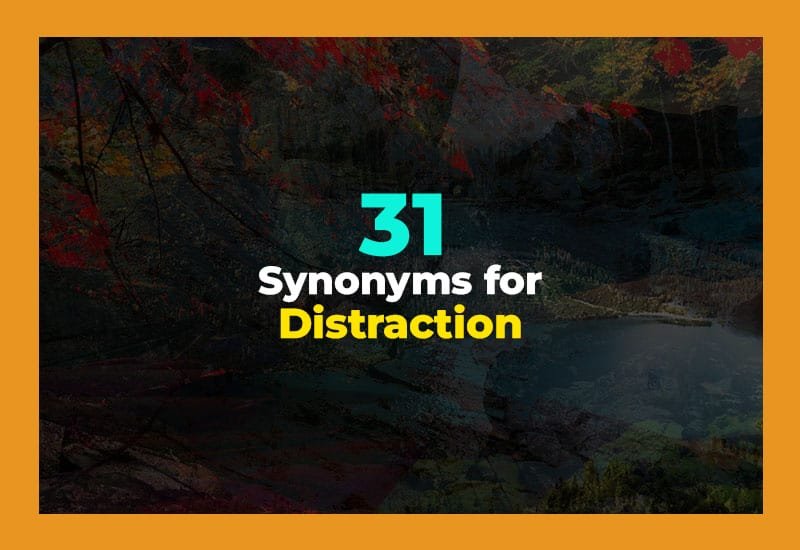
Final Thoughts
I hope this guide gives you a richer vocabulary for describing distractions in various situations. By understanding the subtle differences among these synonyms, you can make your writing or speech more precise and engaging. From interruptions to fascinations, each word adds a unique flavor. Next time you encounter a distraction, you'll know exactly which term fits the moment. Using these words thoughtfully makes communication clearer and more expressive.

